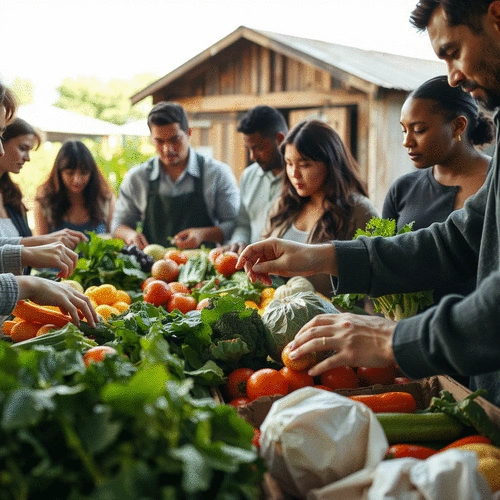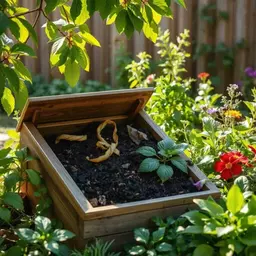In a world where our choices have profound effects on the environment, embracing mindful consumption is not just beneficial—it's essential. By being intentional about our purchases, we have the power to combat climate change and foster sustainable practices. As we navigate through the complexities of consumerism, understanding and implementing mindful habits can lead to a significant positive impact.
What You Will Learn
- Mindful consumption encourages reflection on our purchasing decisions, fostering awareness of their environmental impact.
- Supporting sustainable brands helps promote eco-friendly practices and reduces waste in our communities.
- Conscious consumerism involves researching brands for ethical practices, focusing on quality over quantity, and advocating for sustainable policies.
- Cultural perspectives on consumption, like Japan's Mottainai, can inspire more sustainable habits and appreciation for resources.
- Addressing climate justice is crucial, as it highlights the impact of consumption choices on vulnerable communities and promotes equitable access to resources.
- Practical steps, such as opting for reusable products and planning meals, can significantly reduce our ecological footprints.
- Collaborative efforts and community engagement are vital for promoting mindful consumption and inspiring collective action.
Impact of Mindful Consumption on Climate Change
Understanding how mindful consumption influences our ecological footprints can help drive positive change. By making informed choices, we can reduce waste, conserve resources, and support ethical production. This shift in consumer behavior is crucial for addressing climate change and building a sustainable future. Below are key aspects illustrated for clarity.
Mindful Consumption Benefits
- Reduces waste and conserves resources.
- Promotes healthier lifestyles through conscious choices.
- Encourages community collaboration and shared responsibility.
Principles of Conscious Consumerism
- Research brands emphasizing ethical production.
- Choose quality over quantity to minimize waste.
- Advocate for policies promoting sustainability.
Diverse Cultural Perspectives
- Japan: Mottainai—don't waste resources.
- Sweden: Fika—enjoy sustainable food breaks.
- Native American: Live in harmony with nature.
Climate Justice Considerations
- Low-income communities bear environmental burdens.
- Support equitable access to sustainable resources.
- Discuss how consumption choices affect vulnerable populations.
Understanding Mindful Consumption in the Context of Climate Change
In our fast-paced world, it’s easy to overlook how our daily choices impact the planet. That’s where mindful consumption comes in. It encourages us to pause and reflect on our purchases, advocating for choices that are not just good for us but are also friendly to the Earth. By understanding mindful consumption, we can play a crucial role in addressing climate change and fostering a sustainable future.
Defining Mindful Consumption and Its Importance
Mindful consumption is all about being aware of what we buy and how it affects the environment. It involves making informed choices that prioritize sustainability and minimize waste. When we embrace mindful consumption, we not only reduce our ecological footprint but also support practices that are better for our communities and the planet. This approach plays a significant role in combating climate change by encouraging responsible resource use.
To put it simply, mindful consumption means:
- Evaluating needs: Asking ourselves if we truly need something before we buy it.
- Supporting sustainable brands: Choosing businesses that prioritize eco-friendly practices.
- Reducing waste: Opting for products with minimal packaging or reusable items.
The Link Between Mindfulness and Sustainable Consumer Choices
Research shows that people who practice mindfulness tend to make more sustainable choices. When we take the time to think about our spending habits, we become more aware of the environmental impact of our actions. This awareness leads to better decisions that can help protect our planet. It’s like we’re giving our planet a little love every time we choose wisely! For more ideas on how to live sustainably, check out these easy eco-friendly habits to start.
Here are some ways mindfulness influences our consumer behavior:
- Encourages reflection: Mindfulness helps us think critically about our purchases.
- Promotes gratitude: Recognizing the value of what we have can reduce unnecessary buying.
- Fosters community connections: Mindful consumers often seek out local options, supporting small businesses.
Conscious Consumerism and Its Role in Mindful Consumption
At the heart of mindful consumption lies the idea of conscious consumerism. This concept urges us to consider the ethical implications of our purchases—like labor practices, environmental impact, and the sustainability of products. When we buy consciously, we’re not just making a transaction; we’re supporting a movement towards a more equitable and sustainable world.
To practice conscious consumerism effectively, consider these principles:
- Research brands: Look for companies that prioritize ethical production and sustainable materials.
- Choose quality over quantity: Invest in durable items that are made to last, reducing waste over time.
- Advocate for change: Support policies and initiatives that promote sustainable practices within industries.
At Eco Habits Daily, we believe that every small step counts toward creating a better future. By adopting mindful consumption and conscious consumerism, we can all contribute to meaningful change in combating climate change! Let’s take these steps together and make a difference—one mindful choice at a time.
Quick Summary
Here's a brief recap of the key points discussed so far:
- Mindful consumption encourages us to reflect on our purchases and their environmental impact.
- Practicing mindfulness leads to more sustainable consumer choices, promoting community support and reducing waste.
- Conscious consumerism focuses on the ethical implications of our purchases, supporting sustainability and equitable practices.
Addressing Content Gaps in Mindful Consumption Awareness
As I delve into the realm of *mindful consumption*, I often come across various content gaps that can hinder individuals from fully embracing these essential practices. Many people are simply unaware of the *impact their choices* can have on the environment. By addressing these gaps, we can empower ourselves and others to make informed decisions that contribute to a healthier planet. Here are a few practical steps to enhance awareness and encourage mindful habits!
- Engage in community workshops that educate on sustainable practices.
- Share tips on social media to inspire friends and family.
- Participate in local clean-up events to experience the impact first-hand.
Incorporating these steps into our daily lives not only fosters a culture of awareness but also cultivates a sense of responsibility. At *Eco Habits Daily*, we believe that each small effort adds up to significant change. By sharing knowledge and encouraging open conversations about our consumption habits, we can bridge these gaps together!
Practical Steps for Everyday Mindful Consumption
Practicing mindful consumption doesn’t have to be complicated! Here are some actionable tips that I find effective and simple to implement in daily life:
- Assess your shopping habits: Before making a purchase, ask yourself if you really need the item.
- Opt for reusable products, such as bags, bottles, and containers, to minimize waste.
- Plan meals ahead of time to reduce food waste and make better use of ingredients.
- Support local businesses that emphasize sustainability and ethical practices.
By consciously choosing how we consume, we can greatly *reduce our ecological footprints*. These practical steps not only benefit the environment but also enhance our overall well-being! For more detailed guidance, consider exploring mindful eco-friendly living tips.
Exploring Diverse Cultural Perspectives on Mindful Consumption
It’s fascinating to see how different cultures approach *mindful consumption*. For instance, many indigenous communities have long practiced *sustainable living* by respecting the earth and using resources wisely. Here are some cultural perspectives that shape our understanding of mindful consumption:
- In Japan, the concept of *Mottainai* emphasizes not wasting resources.
- In Sweden, there’s a strong focus on *fika*, which encourages taking breaks and enjoying sustainable food.
- Native American philosophies often promote living in harmony with nature.
By learning from these diverse perspectives, we can develop a more holistic approach to our consumption habits. At *Eco Habits Daily*, I’m inspired to share these insights and encourage others to embrace a variety of practices that resonate with their values.
Understanding Climate Justice in the Context of Mindful Consumption
When we think about mindful consumption, it’s crucial to consider *climate justice*. This concept highlights how social responsibility intersects with environmental stewardship. To foster a fairer world, we need to understand these aspects:
- Recognize that low-income communities often bear the brunt of environmental degradation.
- Support policies that advocate for equitable access to sustainable resources.
- Engage in conversations about how consumption choices impact vulnerable populations.
By integrating *climate justice* into our consumption practices, we can contribute to a more equitable and sustainable future. It’s about making choices that uplift not only ourselves but also those around us.
FAQs About Mindful Consumption and Climate Change
- What is mindful consumption?
- Mindful consumption is the practice of being aware of what we buy, how it's produced, and its environmental and social impact. It encourages making informed choices that prioritize sustainability and minimize waste.
- How does mindful consumption help combat climate change?
- By reducing waste, conserving resources, supporting sustainable brands, and promoting ethical production, mindful consumption directly lowers our ecological footprint and contributes to a healthier planet, thereby mitigating climate change.
- What are the key principles of conscious consumerism?
- Conscious consumerism involves researching brands for ethical practices, choosing quality over quantity, advocating for sustainable policies, and considering the labor and environmental impact of purchases.
- Can cultural perspectives influence mindful consumption?
- Yes, diverse cultural philosophies like Japan's "Mottainai" (don't waste resources) or Native American principles of living in harmony with nature can inspire and guide more sustainable consumption habits.
- What is climate justice, and how does it relate to mindful consumption?
- Climate justice recognizes that low-income and vulnerable communities often bear the disproportionate burden of environmental degradation. Mindful consumption addresses this by advocating for equitable access to sustainable resources and considering how consumption choices impact these populations.
- What are some practical steps for everyday mindful consumption?
- Practical steps include assessing shopping habits, opting for reusable products, planning meals to reduce food waste, and supporting local businesses that prioritize sustainability.
Summarizing the Role of Mindful Consumption in Climate Change Action
Reflecting on how mindful consumption shapes our world reveals a *powerful connection* between our choices and their environmental impact. As I engage with readers at *Eco Habits Daily*, I see firsthand how small changes lead to significant outcomes. Let’s break down these impacts together!
- Mindful consumption reduces waste and conserves resources.
- It promotes healthier lifestyles through conscious dietary choices.
- It encourages community collaboration and shared responsibility.
By embracing mindful consumption, we’re not just making choices for ourselves; we’re building a community committed to combating climate change!
Encouraging Future Action and Collaborative Efforts
As we move forward, it's essential to inspire collective action toward mindful consumption. Everyone has a role to play! Here’s how we can encourage one another:
- Host community forums to discuss sustainable practices.
- Share success stories that inspire others to make positive changes.
- Promote local initiatives that focus on eco-friendly products.
By fostering a culture of support and collaboration, we can amplify our impact and motivate more people to adopt mindful consumption!
Promoting Carbon Neutrality Through Mindful Choices
Finally, let’s talk about the importance of *carbon neutrality*. Our consumption choices play a pivotal role in achieving this goal. Here are some ways to promote carbon neutrality through mindful decisions:
- Choose energy-efficient products and appliances.
- Offset carbon emissions through local environmental projects.
- Advocate for policies that support renewable energy sources.
By making these choices, we actively participate in efforts to reduce our carbon footprint. At *Eco Habits Daily*, I’m dedicated to spreading this message and supporting everyone in their journey toward a sustainable lifestyle.
Recap of Key Points
Here is a quick recap of the important points discussed in the article:
- Mindful Consumption: Involves being aware of our purchases and their impact on the environment, prioritizing sustainability.
- Support Sustainable Brands: Choose companies that emphasize eco-friendly practices and ethical production.
- Reduce Waste: Opt for products with minimal packaging and reusable items to lessen our ecological footprint.
- Conscious Consumerism: Consider the ethical implications of purchases, including labor practices and environmental impact.
- Engage in Community Efforts: Participate in workshops, share tips, and engage in local initiatives to enhance awareness and encourage mindful habits.
- Embrace Cultural Perspectives: Learn from diverse cultural practices that promote sustainable living and respect for resources.
- Integrate Climate Justice: Understand the intersection of social responsibility and environmental stewardship in mindful consumption.
- Promote Carbon Neutrality: Make choices that support energy efficiency and advocate for renewable energy policies.










